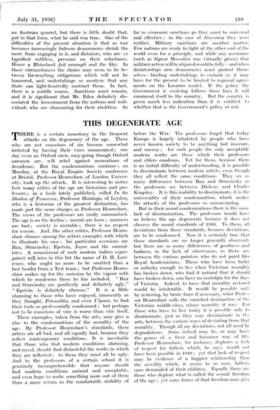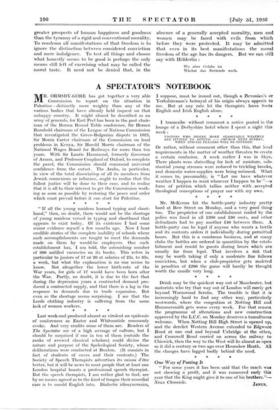THIS DEGENERATE AGE
THERE is a certain monotony in the frequent attacks on the degeneracy of the age. Those who are not conscious of sin become somewhat irritated by having their vices enumerated ; one day even an Oxford crew, easy-going though Oxford oarsmen are, will rebel against accusations of decadence. But the condemnations continue ; on Monday, at the Royal Empire Society conference at Bristol, Professor Hearnshaw, of London Univer- sity, took up the attack. It is interesting to notice how many critics of the age are historians and pro- fessors ; in a book lately published, called In the Shadow cf Tomorrow, Professor Huizinga, of Leyden, who is a historian of the greatest distinction, has made just the same charges as Professor Hearnshaw. The views of the professors are easily summarised. The age is on the decline ; morals are loose ; manners are bad ; society is unstable ; there is no respect for reason. And, like other critics, Professor Hearn- shaw chooses among the artists examples with which to illustrate his ease ; his particular aversions arc Bax, Stravinsky, Epstein, Joyce and the surreal- istes. A connoisseur of such modern indices expur- gatorii will miss in this list the name of D. H. Law- rence, who ought no more to be omitted than a fast bowler from a Test team ; but Professor Hearn- shaw makes up for. the omission by the vigour with which he condemns those he has included. " Bax and Stravinsky are positively and definitely ugly." " Epstein is definitely obscene." It is a little alarming to those who have enjoyed, innocently as they thought, Petruschka, and even Ulysses, to find their taste so professorially condemned ; but perhaps not to be conscious of vice is worse than vice itself.
These examples, taken from the arts, may give a clue to the condemnations of the morality of the age. By. •Professor Hearnshaw's standards, these artists' are all bad, and all equally bad, because they reflect contemporary conditions. It is inevitable that those who find modern conditions alarming, and novel, should find distasteful the works in which they are reflected ; to them they must all be ugly. And to the professors of a certain school it is genuinely incomprehensible that anyone should find modern. conditions . natural and acceptable, and even, hope to make something more out of them than a .mere return . to the comfortable stability of before the War. The professors forget that today Europe is largely inhabited by people who have never known society to be anything but insecure, and uneasy ; for such people the only acceptable modern works are those which their professors and elders condemn. Yet for them, because there is no initial difficulty of understanding, it is possible to discriminate between modern artists, even though they all reflect the same conditions. They see as many differences between Bax and Stravinsky as the professors see between Dickens and Charles Kingsley. It is this inability to discriminate, it is the universality of their condemnation, which make,; the attacks of the professors so unconvincing.
But in their moral condemnations there is the same lack of discrimination. The professors would have us believe the age degenerate because it does not observe the moral standards of 1910. To them, all deviations from those standards, because deviations, are to be condemned. Now it is certainly true that those standards are no longer generally observed ; but there are so many differences, of goodness and badness, in the lack of observance, as there are between the various painters who do not paint like Royal Academicians. Those who have been lucky or unlucky enough to live when Victorian morality has broken down, who find it natural that it should have broken down, can have no nostalgia for the days of Victoria. Indeed, to have that morality restored would be intolerable. It would be possible only by restoring, by brute force if necessary, what Profes- sor Hearnshaw calls the vanished domination of the Victorian middle-class, whose morality it was. For those who have to live today it is possible only to discriminate, just as they may discriminate in the arts, between the various ways of deviating from that morality. Though all are deviations, not all need be degradations. Some indeed may be, or may have the germs of, a freer and humaner way of life. Professor Hearnshaw, for instance, deplores a lack of respect for fathers which, he says, would not have been possible in 1910 ; yet that lack of respect may be evidence of a happier relationship than the servility which, it seems to us now, fathers once demanded of their children. Equally there arc those who deplore what is called the sexual freedom of the age ; yet some forms of that freedom may give greater prospects of human happiness and goodness than the tyranny of a rigid and conventional morality. To condemn all manifestations • of that freedom is to ignore the distinction between considered. conviction and mere indulgence. To test all things and choose what honestly seems to be good is perhaps the only means still left of exercising what may be called the moral taste. It need not be denied that, in the absence of a generally accepted morality, men and women- may be faced with evils from which before they were protected. It may be admitted that even in its best manifestations the moral freedom of the age has its dangers. But we can still say with 11451derlin :
Wo aber Gefahr ist Witchst das Rettende auch.







































 Previous page
Previous page